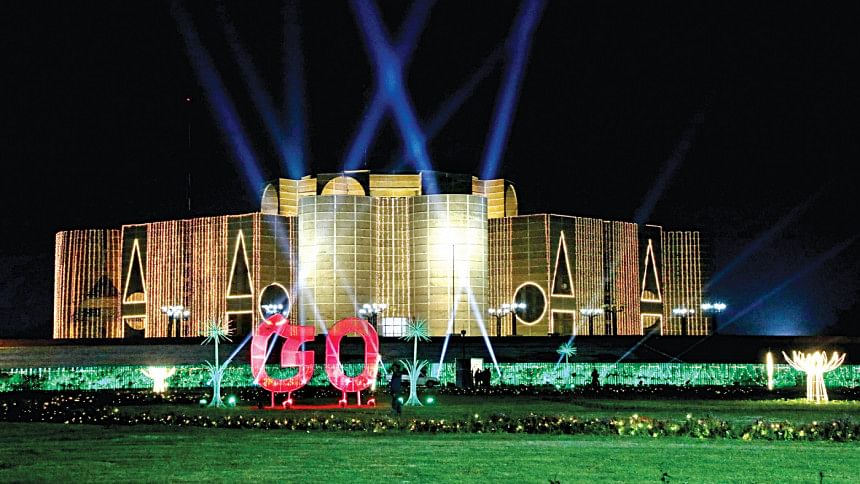‘The House in decline’

The standard of the Jatiya Sangsad is declining continuously and its character is changing also. If the House is to be made the centre for all activities, the people's sorrows and sufferings have to be discussed there.
Lawmakers from the Jatiya Party, Workers Party and Jatiya Samajtantrik Dal (JSD) said this in parliament yesterday while taking part in the discussion on a proposal.
Workers Party and the JSD are components of the ruling Awami League-led grand alliance.
Prime Minister Sheikh Hasina on Friday placed the proposal in the House, which is now in a special session on the occasion of its golden jubilee.
Taking part in the discussion, the MPs also said it is necessary to assess how much the Jatiya Sangsad has been able to hold the government accountable.
However, AL lawmakers highly lauded the PM for advancing the country towards development and prosperity.
Rashed Khan Menon, president of Workers Party, said, "Father of the Nation Bangabandhu had said that we will form such a parliament which might be a learning lesson for others. But unfortunately, we are seeing that the standard of our parliament has been declining continuously over the last few years."
Citing a study on a national parliament, Menon said it showed that in a one-hour speech in parliament, people's issues are discussed for three minutes while the rest of the time is spent on talking about the lawmaker himself, his party and the leader of his party.
President Abdul Hamid in his Friday's speech in parliament also said that the need may arise to invite external experts to examine, evaluate and analyse laws, Menon added.
"Today the character of our parliament is changing continuously. Parliament is having a new facedue to commercialisation of politics and elections."
He said it is necessary to review the constitution and reform parliament.
JP MP Anisul Islam Mahmud said, "If we want to make the Jatiya Sangsad the focal point for all activities, people's sufferings must be discussed there.
"If this discussion is not held, parliament will not be the centre for all activities. Rather, the talks held outside parliament would become the focal point, the writings of the newspapers would get priority."
He said it is not only the opposition parties' responsibility to speak for the people.
Another JP MP named Shameem Haider Patwari said that numerous laws have been passed in parliament over the last 50 years.
"But we need to evaluate to what extent we have been able to make the government accountable. How much can we force the government to make a right decision cancelling a wrong one?" he said.
JSD President Hasanul Haque Inu demanded formation of a parliamentary committee to review the constitution to remove the issues contradictory to the fundamental principles of the constitution, to remove the confusion about the small ethnic groups, and to empower lawmakers by amending article 70.
Inu highly praised Bangabandhu and the PM, and blasted the BNP.
Information and Broadcasting Minister Hasan Mahmud said it is not the responsibility of the government to bring any party to an election.
"The Election Commission can carry out the responsibility of seeing who will take part in an election or not. It's not the responsibility of the government," he said.
AL MP Tanvir Shakil said many local and foreign conspiracies are afoot.
"Today our great Liberation War and independence have been insulted. A conspiracy has been hatched against the government through insulting the Independence Day and exploiting a child.
"I would like to ask the civil society and their newspapers where the spirit of freedom was when the Indemnity Ordinance was promulgated. Where was freedom when the grenade attack was carried out on August 21? You didn't talk about freedom then," Tanvir said.
Quoting Harold Laski, an English political theorist, AL MP Shajahan Khan said freedom of speech and freedom of the press are correlated.
"How much freedom a country enjoys depends on its social and economic conditions. Freedom of speech and freedom of the press is more advanced in a country which is more educated and more aware of civil rights, economically developed," he said.
Shajahan said it is unfair to expect too much freedom of speech in a country that is backward in terms of education, social awareness and financial system.
"If this freedom is given in a backward country, it will be like handing a cooking spud to a child," he added.

 For all latest news, follow The Daily Star's Google News channel.
For all latest news, follow The Daily Star's Google News channel. 



Comments